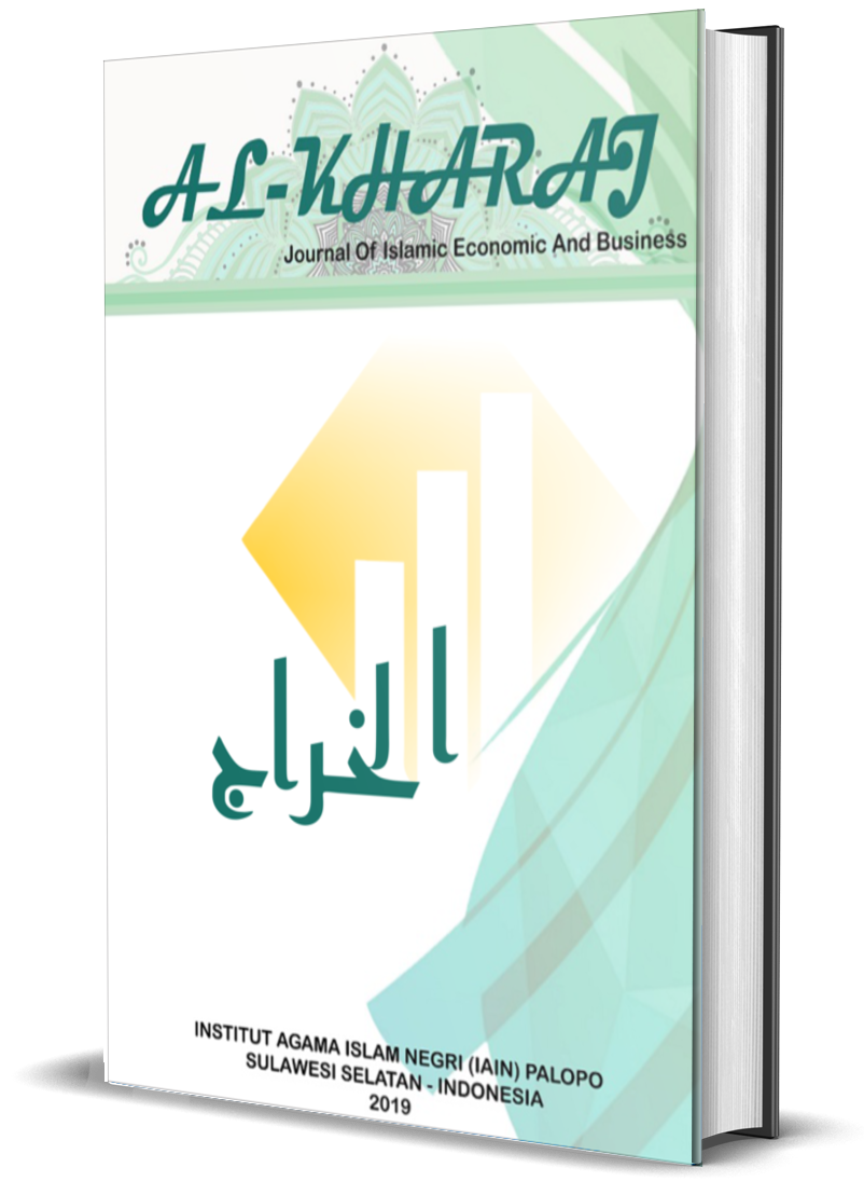Analysis of Profits and Risks of Ice Tea Franchise Cooperation in Palopo City Perspective Sharia Economics
DOI:
https://doi.org/10.24256/kharaj.v7i3.6766Keywords:
Franchise; cooperation agreement; Shirkah inanAbstract
This paper discusses how Islamic economic principles influence the expansion of franchise businesses across various sectors. The study analyzes the form of franchise cooperation agreements for Es Teh Nusantara, Es Teh Ori, and Es Teh Poci , as well as a review of Islamic economic principles concerning the benefits and risks of these franchises. The research method used is qualitative, with primary data from observations, in-depth interviews, and documentation. The research findings indicate that the three tea drink franchises exhibit similar cooperation patterns, where the franchisor grants rights to the franchisee and imposes obligations to run the business according to the franchisor's concept. One element of the franchise contract is the licensing by the franchisor to the franchisee to use Intellectual Property Rights (IPR) in exchange for royalty payments. This franchise business falls under syirkah inan , which is a form of capital cooperation between two or more parties with profit or loss sharing according to the capital contributed, using a mudharabah or profit-sharing system. The agreement used is similar to an ijarah agreement, involving the transfer of IPR benefits from the franchisor to the franchisee for a specific period.
References
Arif, M., & Djatmiko, B. (2022). Feasibility Study Business Development Ajwa Archery Collaboration and Community Based. Economic: Journal Economic and Business, 1(1), 41–46. https://doi.org/10.56495/EJEB.V1I1.251
Ghufron, Moh. I., & Fahmiyah, I. (2019). KONSEP WARALABA PERSPEKTIF EKONOMI ISLAM. Amwaluna: Jurnal Ekonomi Dan Keuangan Syariah, 3(1), 133–148. https://doi.org/10.29313/amwaluna.v3i1.4287
Herman, A. (2022). Konsep Syirkah Menurut Imam Syafi’i (Dasar, Relevansi, dan Implikasinya).
Hidayat, W. (2019). INTEGRASI ANALISIS SWOT, KONSEP 5 C DAN MAQOSHID SYARIAH DALAM PENERAPAN MANAJEMEN RESIKO DI BMT. Islaminomics: Journal of Islamic Economics, Business and Finance, 9(2), 195–211. https://doi.org/10.47903/JI.V9I2.90
Idrus, N. S., Fatmawati, J. R. S., Labu, P., & Selatan, J. (2017). ASPEK HUKUM PERJANJIAN WARALABA (FRANCHISE) DALAM PERSPEKTIF HUKUM PERDATA DAN HUKUM ISLAM. Jurnal Yuridis, 4(1), 28–45. https://ejournal.upnvj.ac.id/index.php/Yuridis/article/view/125
Kotimah, E. K., & Santoso, L. (2017). Urgensi Tanda Tangan Dan Materai Dalam Memberikan Kepastian Hukum Terhadap Kontrak Waralaba (Franchise). Syariah Jurnal Hukum Dan Pemikiran, 16(2), 115. https://doi.org/10.18592/sy.v16i2.1024
Latif, B. T. C. dan M. A. (2014). MANAJEMEN RESIKO BISNIS FRANCHISE KUCH2HOTAHU DALAM PERSPEKTIF SYARIAH DI KABUPATEN KUDUS. Seminar Nasional Dan Call for Paper Program Studi Akuntansi FEB UMS, 163–184.
Muhammad Erland Fauzi. (2017). Syirkah Prinsip Bagi Hasil pada Pembiayaan Di Bank Syari’ah. Islamic Banking : Jurnal Pemikiran Dan Pengembangan Perbankan Syariah, 2(2), 56–79. https://doi.org/10.36908/ISBANK.V2I2.32
Nur, M., & Harlande, B. P. (2017). DAMPAK BISNIS FRANCHISE KELOMPOK USAHA MIKRO KECIL MENENGAH TERHADAP PENERIMAAN PAJAK. Ilmu Dan Budaya, 40(53). https://doi.org/10.47313/JIB.V40I53.272
Okezone.Economy. (2019). Omzet Rp150 Triliun, Momentum Emas Ekspansi Bisnis Waralaba : Okezone Economy. Koran Sindo. https://economy.okezone.com/read/2019/04/22/320/2046337/omzet-rp150-triliun-momentum-emas-ekspansi-bisnis-waralaba
Riezka Eka Mayasari. (2018). WARALABA (FRANCHISE) DALAM SISTEM HUKUM ISLAM DAN HUKUM POSITIF DI INDONESIA. Al-Ishlah: Jurnal Ilmiah Hukum, 21(2), 108–114. http://jurnal.fh.umi.ac.id/index.php/ishlah/article/view/21
Setiawan, D. (2013). KERJA SAMA (SYIRKAH) DALAM EKONOMI ISLAM. Jurnal Ekonomi, 21(03). https://doi.org/10.31258/JE.21.03.P
Shalihah, M. (2017). KONSEP SYIRKAH DALAM WARALABA. http://bisnis.liputan6.com
Utami, A. D. (2010). Konsep franchise fee dan royallty fee pada waralaba bakmi Tebet menurut prinsip Syariah. http://repository.uinjkt.ac.id/dspace/bitstream/123456789/2578/1/ANNISA DYAH UTAMI-FSH.pdf
Wahid, Moh. A. R. (2016). PERAN KAIDAH FIQH TERHADAP PENGEMBANGAN EKONOMI ISLAMI. El-Jizya : Jurnal Ekonomi Islam, 4(2), 219–236. https://doi.org/10.24090/EJ.V4I2.2016.PP219-236
Wibowo, D. T., Nafisa, A., & Alie, M. (2019). HASIL DAN RISIKO PORTOFOLIO BERBASIS SINGLE-INDEX MODEL SEBAGAI STRATEGI INVESTASI PADA PASAR MODAL (Studi Saham Indeks LQ45 Bursa Efek Indonesia). http://ejournal.uniramalang.ac.id/index.php/dialektika/announcement/view/5
Yulianti, F. (2021). Aspek Hukum Dalam Franchise (waralaba). http://kuliahonline.unikom.ac.id/?listmateri/&detail=45914
Zakiyatun Nufus. (2020). View of SYIRKAH DALAM PEMAHAMAN EKONOMI ISLAM SEBUAH SOLUSI PERMASALAHAN PERMODALAN. At Taajir, 1(1). http://www.journal.iai-agussalimmetro.ac.id/index.php/attaajir/article/view/527/220
Downloads
Published
How to Cite
Issue
Section
Citation Check
License
Copyright (c) 2025 nuramalmas Amal, Nining Winda Irawati Nining, Lutfiah Kartika Lutfiah, Muh. Yusran Yusran

This work is licensed under a Creative Commons Attribution-ShareAlike 4.0 International License.
Authors retain copyright and grant the journal right of first publication with the work simultaneously licensed under a Creative Commons Attribution-ShareAlike 4.0 International License. In line with the license, authors are allowed to share and adapt the material. In addition, the material must be given appropriate credit, provided with a link to the license, and indicated if changes were made. If authors remix, transform or build upon the material, authors must distribute their contributions under the same license as the original.









